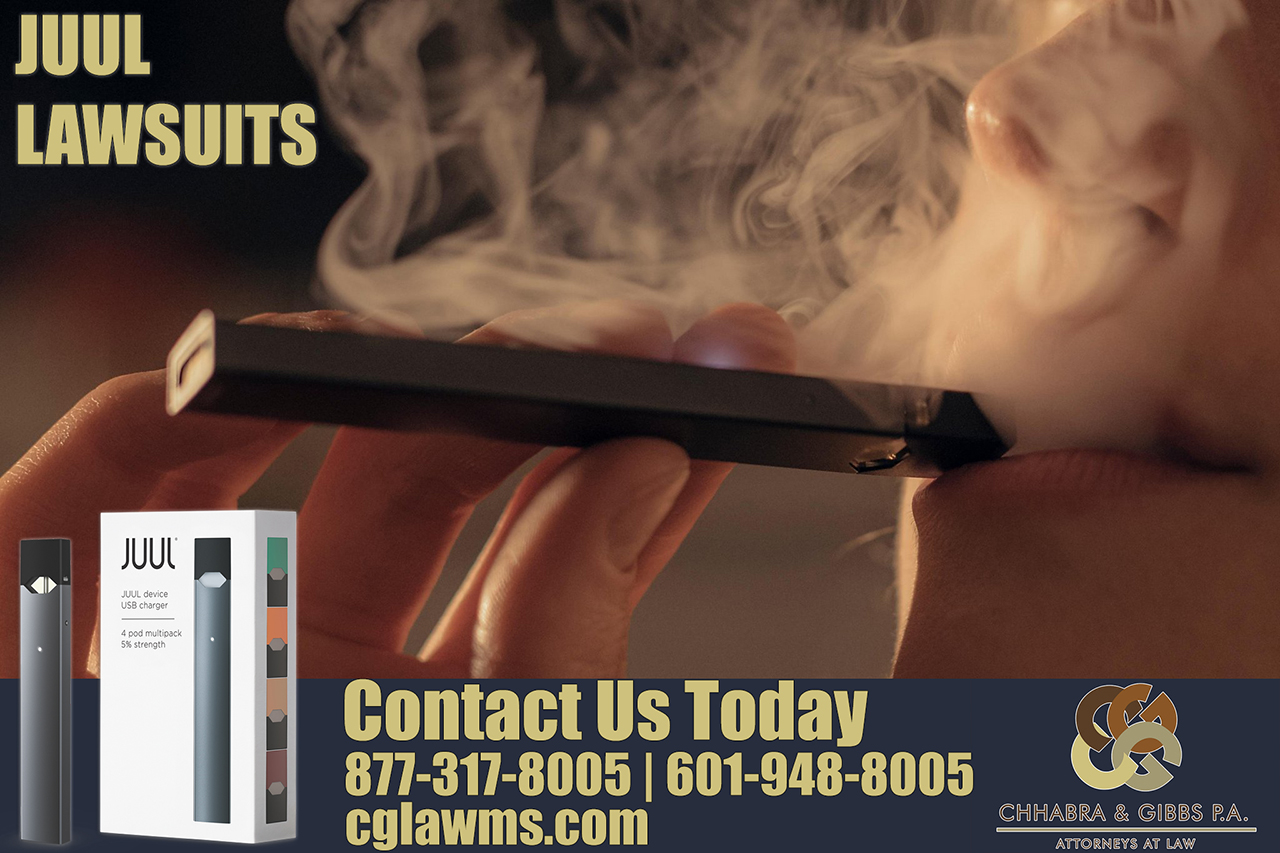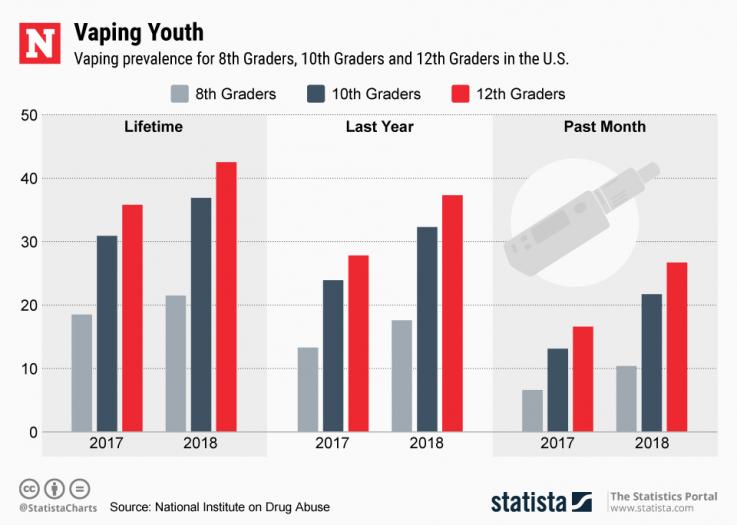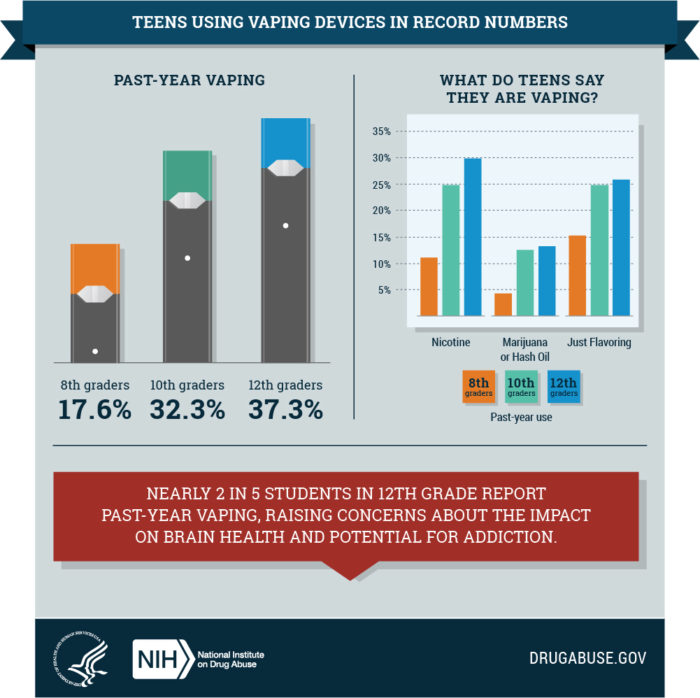JUUL Teen Addiction And Nicotine Epidemic Lawsuits

Smoking e-cigarettes has greatly spiked in popularity in the past few years and it is negatively impacting the youth in United States of America. One of the most popular companies taking advantage of this is JUUL. JUUL has deceived smokers into believing that e-cigarettes are a safe alternative to quitting and also has deceived non-smokers, especially teenagers into believing that e-cigarettes are safe to use. The same time that users of this product are believing this information, they are also not being properly warned about the true dangers of nicotine addiction and related diseases. They must be held accountable.
Just recently Altria Group, Inc., one of the world’s largest producers and marketers of tobacco, cigarettes and related products and its Subsidiary, Phillip Morris, recently acquired a 35 percent ownership ($12.8 billion) in JUUL which values the company at $38 billion dollars. Juul represents 75 percent of the e-cigarette market. This all-cash deal drew a lot of criticism for JUUL, because it originally positioned itself as an enemy of Big Tobacco. Juul was originally part of a parent company, PAX, but split from them in 2017. Part of this deal with Altria and Phillip Morris allows JUUL to gain top-shelf space so the e-cigarette pods can be displayed alongside Marlboro cigarettes.
Recently a class-action lawsuit on behalf of a 15 year old teen addicted to Juul e-cigarettes has been filed in Florida. The suit identified seven causes on why JUUL harmed its consumers:
- RICO VIOLATION The suit alleges JUUL and co-defendants had “goals to deceive consumers by claiming they did not market to children while engaging in marketing and advertising with the intent of addicting children into becoming lifetime nicotine users.”
- FRAUD The suit alleges JUUL fraudulently and deceptively sold or partnered to sell JUUL products as less addictive nicotine products than cigarettes when “defendants knew it to be untrue. “
- FAILURE TO WARN The lawsuit accuses JUUL of “intentionally downplayed, misrepresented, concealed and failed to warn of the heightened risks of nicotine exposure and addiction.”
- DESIGN DEFECT The suit calls JUUL products “inherently defective.” It claims they deliver more nicotine than the company lets people know about.
- NEGLIGENCE The suit accuses the company of failing to ensure that its marketing does not target children and that their products are not designed in a way to attract minors.
- UNJUST ENRICHMENT The suit alleges the defendants were “enriched at expense of plaintiffs.”
- VIOLATION OF FLORIDA’S DECEPTIVE AND UNFAIR PRACTICES ACT The suit accuses defendants of “having knowingly developed, sold, and promote a product that contained nicotine levels in excess of cigarettes with the intention of creating and fostering long-term addiction to JUUL products for minors to continue that addiction into adulthood.”
The liquid inside JUUL cartridges contains glycerol, propylene glycol, flavoring, benzoic acid, and 40 milligrams of nicotine. Medical professionals are very concerned because JUUL delivers higher concentrations of nicotine than other vaping devices. According to recent studies, The liquid being 5% nicotine by volume, which is more than twice the concentration of nicotine in similar devices like the Blu vape cartridge (2.4% nicotine), greatly increases the risk of addiction. Some studies show that nicotine is about as addictive as cocaine and even more addictive than alcohol and anti-anxiety drugs.
Not only is the nicotine highly addictive, but it is toxic to fetuses, and impairs brain and lung development in youth. It also interacts with any cancer cells potentially present in the body making cancer worse. Nicotine stimulates the nervous system and cardiovascular system, leading to heart disease. Youth using nicotine have more asthma as well. There is also recent evidence linking vaping with chronic pulmonary obstructive disease and other permanent damage. Unlike other companies, JUUL uses nicotine salts that more closely resemble nicotine found in tobacco leaves. This allows nicotine more readily absorbed into the bloodstream and vapor less harsh so that it is easier to inhale more nicotine for longer periods. The pods that are used with the device contain a greater amount of benzoic acid, which causes coughs, sore throats, abdominal pain, nausea, and vomiting when exposure is constant.
The FDA started notifying the public in April 2019 that some people, “especially youth and young adults” are reporting seizures following vape device use. Seizures or convulsions are known potential side effects of nicotine poisoning and have been reported in medical journals, but in association with the accidental swallowing of nicotine vape liquids, such as when toddlers get hold of a vape pod.
According to the FDA, the 35 reports it has received of vape device-related seizures have occurred after vaping. The agency says that’s enough to warrant, noting that the reports may not represent all the cases that occur.
An estimated 4.8 million teenagers used e-cigarettes last year, and a lot of this is due to advertising that targets our youth which contributes to the popularity of vaping in young people. The National Institute on Drug Abuse also reported that in 2018 17.6 percent of 8th graders, 32.3 percent of 10th graders, and 37.3 percent of 12th graders reported vaping in the past year. Some teens are also ignorant about what is in an e-cigarette with 25.7 percent of 12th graders saying that they think they are just vaping flavoring, according to the NIDA.

JUUL devices are available in a variety of colors and can be covered in custom skins that feature school colors, mascots, artwork, and even cartoons and logos. JUUL and other vaping companies sell the pods in a variety of fruit, candy, and other sweet flavors that appeal to young kids and teens. JUUL exploited social media marketing such as Facebook, Instagram and Twitter and target their ads towards teens. They also paid social media influencers, who had large youth followers, to promote the JUUL prodcut. Even as JUUL advertising has slightly changed, there has not been adults in the advertising.



